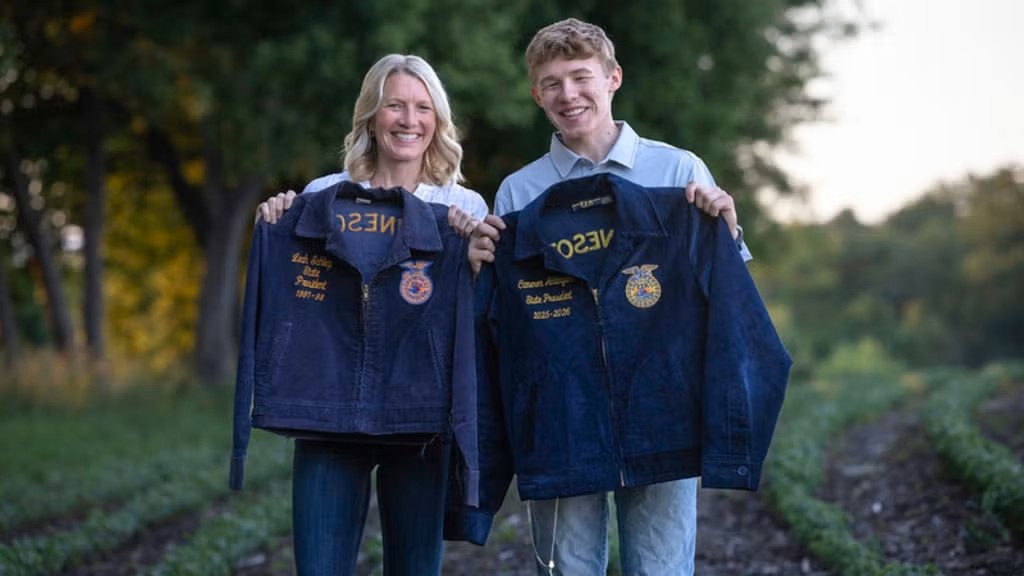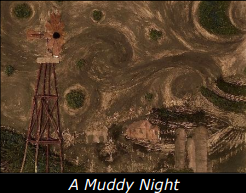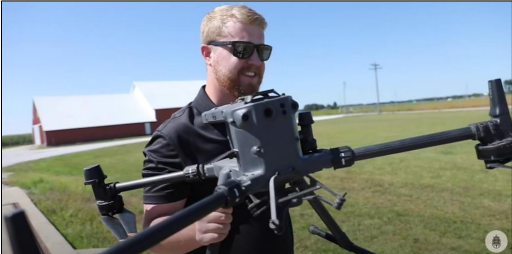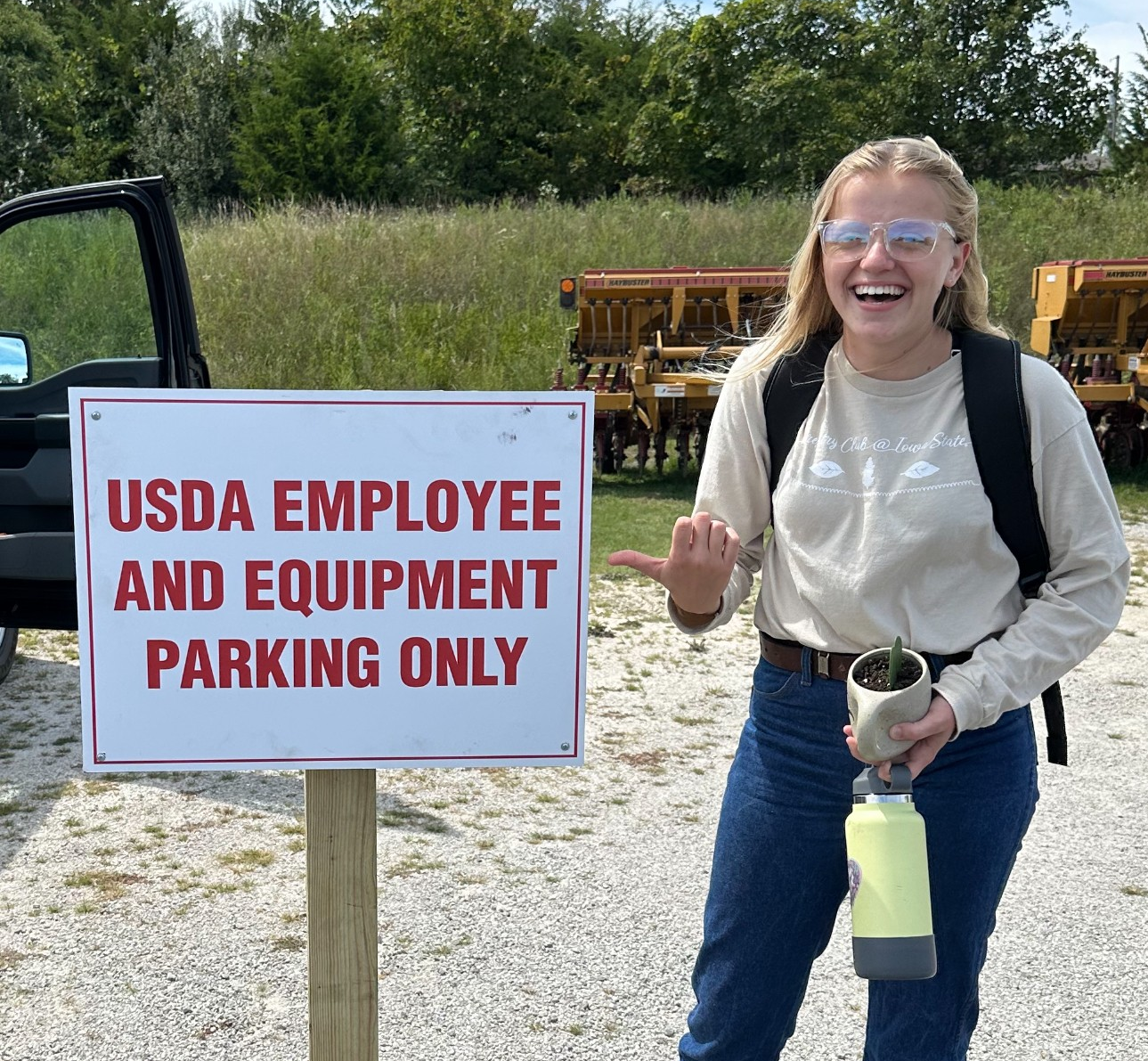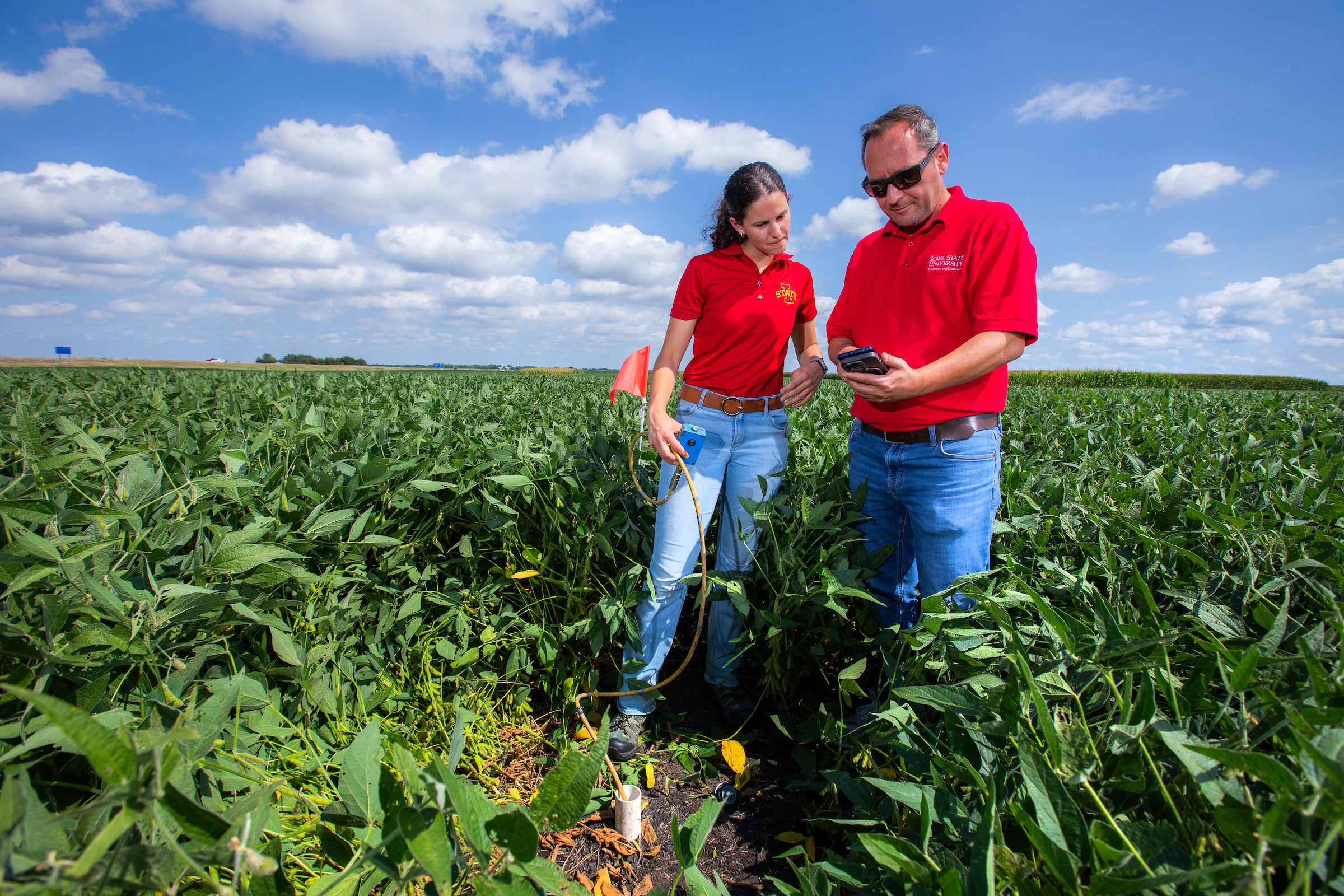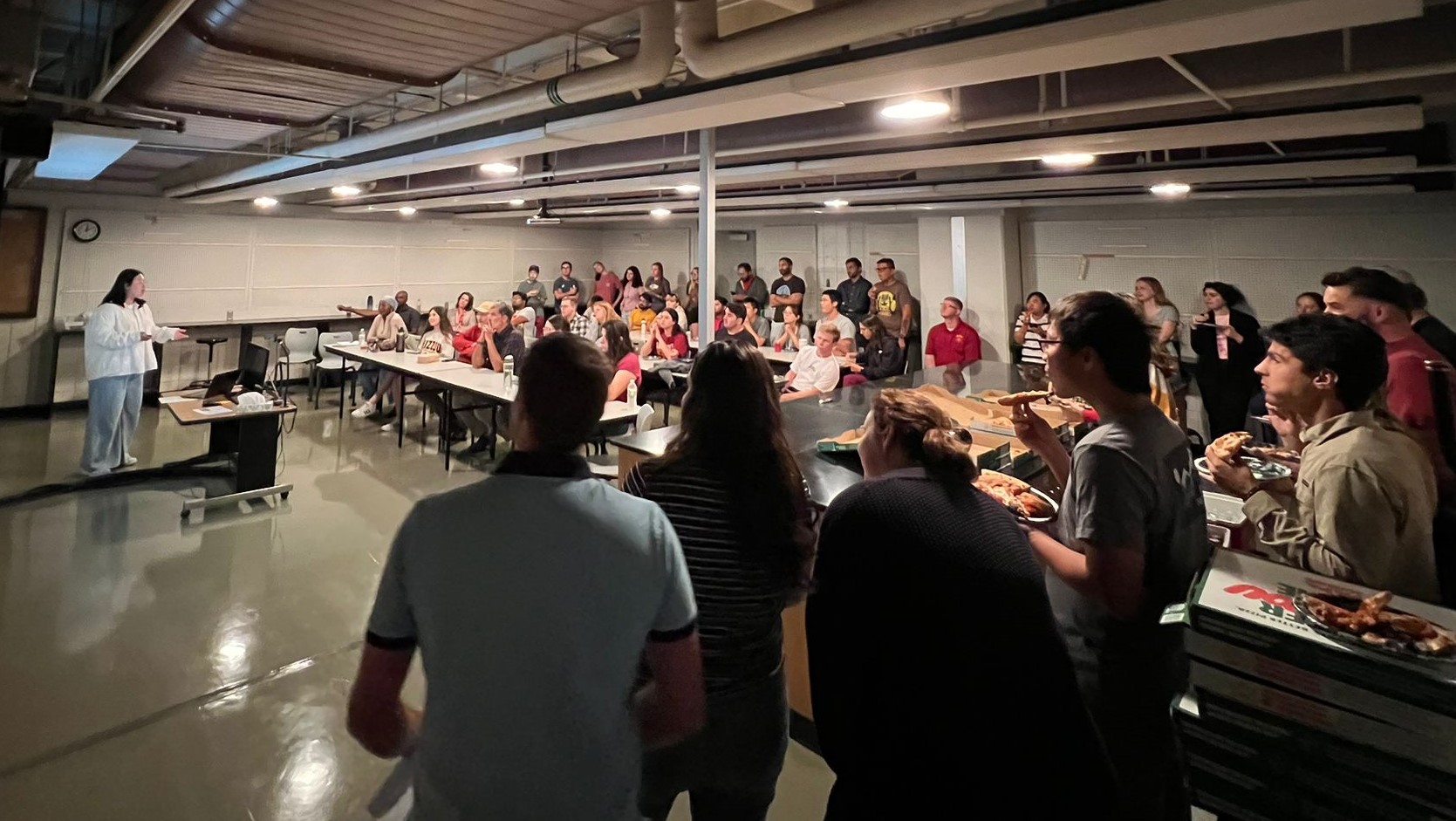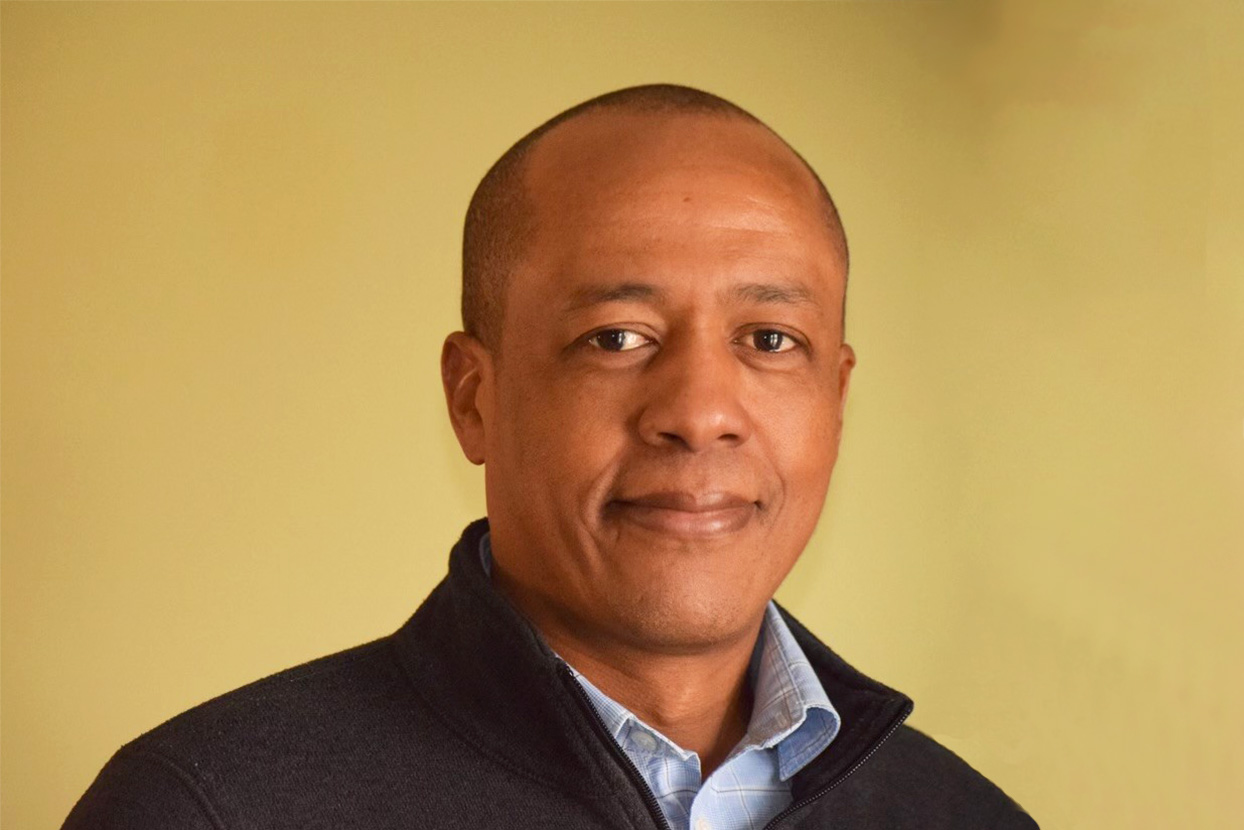Join us from 4-6pm on Tues., Sept. 3, in the Agronomy Hall Commons area for an ice cream social Sponsored by the CARE (Connecting AgRonomists from Everywhere) Committee. Comments from Department of Agronomy Interim Chair Dr. Mary Wiedenhoeft and a representative from the CARES Committee will be at 4:30pm. Faculty, staff, undergraduate and graduate students are welcome!
Turning manure into magic: Iowa farmer, ISU researchers use byproduct to cut synthetic fertilizer use
AMES, Iowa — Farming in Iowa comes down to dirt. And how healthy it is.
A new study with Iowa State University College of Agriculture’s agronomy department researchers shows how farmer Bryan Sievers of Stockton, Iowa, is improving his soil.
This project started 12 years ago.
Sievers put in something called an anaerobic digester. It’s basically a giant composter that uses microorganisms to break down organic waste.
“I just knew that it was a way to take your manure, process the manure, and maximize the value of that resource,” Sievers says. “The material that comes out is, is really nature’s best fertilizer.”
The result is biogas, a slurry, and a solid, called digestate.
Sievers uses the digestate, and he has to apply little manmade fertilizer.
Sebastian Villarino, Fernando Miguez, and Sievers co-authored a study in the Journals of Agriculture and Food Research. The report says how digestate made the soil better.
Sievers sees a future for this for other farmers.
“That’s potentially one of the biggest rewards from this approach is that if you have farmers, neighboring farmers who don’t either have the desire to build an anaerobic digester or the or the capital or the livestock, or, you know, the resources that it takes to build a digester, they can still be part of this,” he says.
The Iowa State scientists see great potential.
“In my opinion, the significance of this study is that we’re showing this at a commercial scale, which is not very common,” says Miguez.
Original Article: https://www.kcci.com/article/iowa-state-university-farmer-soil-health-digester/69048801
From Blue Jackets to Cardinal and Gold: ISU Agronomy Freshman Honors FFA Legacy
Most kids don’t grow up surrounded by state officers and convention stages, but for Cameron Addington, a member of the Canon Falls FFA Chapter, FFA wasn’t just an organization; it was part of his family’s legacy.
After wrapping up her term as the 1997-98 Minnesota FFA president, Leah Addington worked for the state association as its leadership development coordinator. “Cameron went to his first state convention at three weeks old,” she says. “[FFA] is in his blood.”
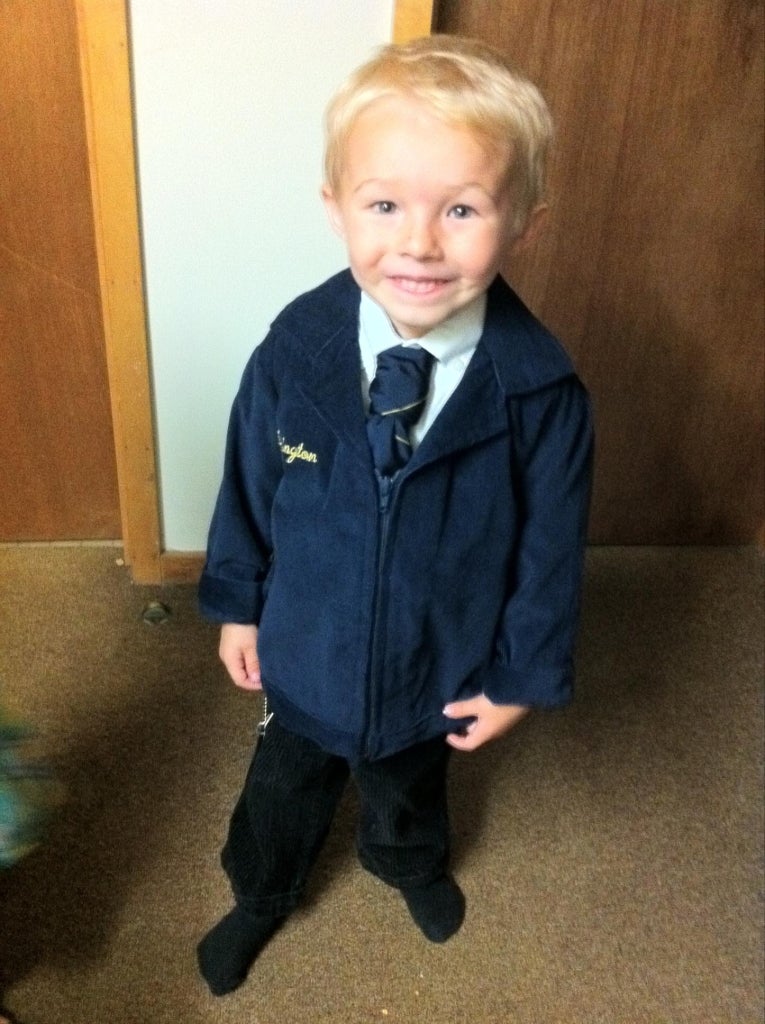
Cameron Addington sports his first blue corduroy jacket. Photo courtesy of Cameron Addington.
Some of Cameron Addington’s first memories are at the Deep Portage Learning Center, where Minnesota FFA hosts summer camps and state officer trainings. Still, joining FFA and running for state office were actions he chose to do on his own accord.
“It felt like a natural choice to join right away in seventh grade with my local chapter,” Cameron Addington says. “Having family members who were there to support me and the opportunity to influence and interact and hear stories — that’s really why I wanted to run.”
Like many FFA members, Cameron Addington didn’t grow up on a farm. Still, he took every opportunity to learn by showing livestock at the county fair and working for local farmers. “Don’t ever short yourself the opportunity to learn new skills and try new things,” he says.
Luckily for Cameron Addington, his mom has been there for his entire journey. When he placed third in the National FFA Prepared Public Speaking Leadership Development Event, she proudly supported him. From her perspective, watching Cameron’s hard work and preparation pay off was one of the most meaningful moments in his FFA career. Years earlier, Leah Addington had been the one delivering speeches in the blue jacket. Now, she’s watching her son follow a remarkably similar path, right down to the state president title.

Twenty-eight years after his mom held the role, Cameron Addington was elected as a state FFA president. Photo courtesy of Cameron Addington.
But Cameron Addington is making the office his own. He and his team of state officers have three main goals for Minnesota FFA in the coming year:
- Support Minnesota’s regions and chapters.
- Prioritize social media outreach.
- Break down the barriers of traditional and nontraditional FFA backgrounds.
As Cameron Addington carries forward his family’s legacy, he’s demonstrating that FFA isn’t just about where you come from — it’s who you choose to become and the lives you impact along the way.
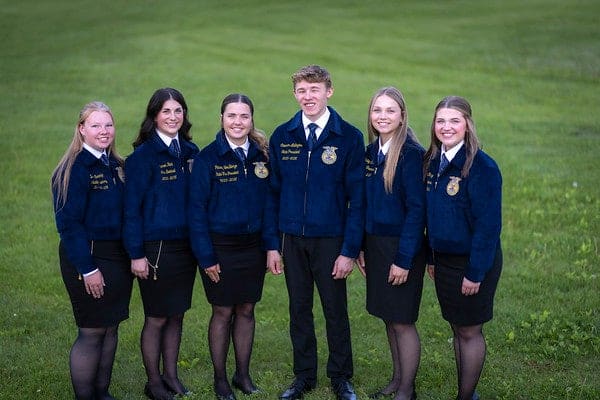
Cameron Addington (third from right) and his teammates are spending a year representing members, advisors and chapters across their state. Photo courtesy of Cameron Addington.
Original Article: https://www.ffa.org/the-feed/minnesota-state-presidents-share-a-special-bond/
Pre-semester trip opens agronomy students’ eyes to opportunities

By Katrina Hageman
Each fall, the Department of Agronomy aspires to try something unique and different with its Agronomy New Student Learning Community field trip. This year, students and faculty traveled to southwest Iowa, where a highlight was a farm-to-table dinner hosted by College of Agriculture and Life Sciences alums.
The annual field trip takes place the Friday and Saturday before the fall semester begins and aligns with the department’s commitment to helping incoming first-year students establish a sense of community.
“The first weeks of college are the hardest,” said Mary Wiedenhoeft, Morrill Professor of Agronomy and academic advisor. “We want to help students get through the transition fast, feel comfortable when classes begin, and help them find their people.”
On the first day of the trip, students toured Iowa Cover Crop in Jefferson, the Wallace Farm near Orient, and Iowa State’s Neely-Kinyon Memorial and Research Demonstration Farm by Greenfield.
CALS alums Daniel (‘05 agronomy) and Ellen Walsh-Rosmann (’09 public service and administration in agriculture, international agriculture) hosted dinner on their farm near Harlan. The Rosmanns own Milk & Honey, a farm-to-table restaurant on Harlan’s historic town square that uses Iowa-sourced ingredients in their dishes.
“Students were able to interact with community members at the farm-to-table dinner,” said Rebecca VanderHeiden, agronomy academic advisor and learning community coordinator. “The community thought it was fascinating to talk to students who come from different states and agricultural backgrounds.”

“The farm-to-table dinner was fun and uplifting to see how agriculture impacted all of their decisions with the meal,” said Kate Wenger, a freshman in agronomy. “Each course was sponsored by a small agricultural business, which opened my eyes to possible careers in agriculture.”
“The meal included multiple courses of charcuterie, salad, steak and more,” said Cameron Addington, a freshman in agronomy. “The fellowship, farm-to-table story, and delicious food made the meal the highlight of the field trip.”
On the second day, students visited Farm Service Cooperative in Defiance, Agriland FS in Harlan, and Garrett Land and Cattle near Arion. A unique aspect of the trip is students get to interact with CALS alums who work at many of the places they visit.
“We visit alums on the learning community trip because they are passionate about giving back and connecting with future students,” VanderHeiden said. “Agronomy faculty and staff are very supportive of the trip and truly work together to make this a great experience for our incoming freshmen.”
The learning community trip creates opportunities for incoming students to build friendships and learn about the many careers available in agronomy.
“My favorite part of the trip was making connections and setting myself up for success by introducing myself to peers before classes began,” said Caleb Goldschmeding, peer mentor and a sophomore in agronomy. “Meeting the professors I will have for the next four years was very beneficial and seeing a glimpse of what we would be learning in the future was exciting.”
“During the trip, I found people who have the same goals and common interests, which helped me find a community of my own,” said Mason Clarahan, a sophomore in agronomy and animal science and peer mentor. “It’s nice to be in a community that builds me up and wants to see me succeed and be more than just a number at this big university.”
Once the pre-semester trip is over, students in the learning community continue to gather throughout the academic year, attending socials, exploring campus, taking part in scavenger hunts, and hosting guest speakers and student panels to keep their connections with each other strong.
Soilscape builds on century of effort to provide practical information to Iowans

AMES, Iowa — From the old paper soil maps to the new, high-tech, interactive environment of Soilscape.org, Iowa State University scientists have led efforts to characterize a largely hidden landscape — the ground under our feet, farms, homes and businesses.
Soilscape
Advanced soil mapping techniques leverage digital, geospatial tools that make soils information more immediate, accessible and communicative, according to Professor Bradley Miller, agronomy, manager of Iowa State’s Geographic Laboratory for Soil Informatics.
“We are improving capabilities all the time,” Miller said. He is one of the creators of Soilscape. The new public resource integrates data from the long-time soil survey data with advanced landscape analytics to enhance public access to comprehensive soil information.
“Soilscape offers user-friendly tools and visualization that empower researchers, land managers and the public to explore and understand soil and environmental data like never before,” he said. “Using the website’s interactive maps, you can easily turn on or off layers of information relevant to your interests.”
At this point, the resource is most well developed for Iowa, but the team, which includes Michigan State University partners, plans to continue updating the platform to add details and expand the coverage areas. They are also working on a set of tutorials to make it easy to find soil descriptions for a particular location.
Soils change
Tools like Soilscape have led to identification of new soils in Iowa. In 1971, 270 soils had been identified in Iowa. Now, more than 500 soils have been described in the state, according to soil scientist Lee Burras, Morrill Professor of Agronomy at Iowa State.
“Soils are not static,” Burras said. “There is a misperception that ‘once a Clarion loam, always a Clarion loam.’ We have the same amount of land, so what changed? We’ve learned more as we have refined soil survey interpretations, largely through these new digital soil mapping techniques.”
For example, there is a need to update information about soil organic matter, which is essential to predict nutrient needs for crops, Miller emphasized. “What we have is a reasonable starting point, but agronomic models can’t be reliable until that information is improved.”
Soil matters
A complex mix of earth, soils are formed by the “parent material” in a specific location interacting with climate, living organisms and topographical relief, over very long – and sometimes surprisingly short – time scales. Iowa’s soils, generally rich from eons of decaying prairie plants and melting glaciers, have long been recognized as a unique and valuable resource that undergirds agriculture, the state’s most important industry.
The National Cooperative Soil Survey was founded in 1896, and Iowa’s first soil map was created for Dubuque County in 1902. In the 1950s, leadership for the soil survey was assigned to the USDA Soil Conservation Service (SCS), now the Natural Resources Conservation Service. SCS staff did much of the field work to sample soils, sending thousands of soil core samples to laboratories at Iowa State and elsewhere to be studied and characterized. The results were published in large volumes of soil maps that located soils in closely related “series” reflecting a spectrum of characteristics such as depth and climate.
Much of the work was supported by USDA, in part through the collaborative NCERA3: Soil and Landscape Assessment, Function and Interpretation — the third regional USDA multi-state project in the country, which continues today. Burras and Miller serve on the committee, building on the legacy of Iowa State soil scientists Gerald Miller and Tom Fenton, who helped found the group.
The soil mapping conventions the committee established decades ago provide a wealth of information about a piece of land, including its drainage potential, slope and soil structure. Such considerations are important, whether one is considering a building project, constructing a pond or installing a conservation practice.
The soil maps also include corn suitability ratings (or CSR values) used to help compute a land’s value for purposes like tax assessments based on soil types and their potential productivity. In 2013, the CSR values were updated. Burras led development of the revised CSR2 system, and he continues efforts to refine methods to describe the factors that impact soil structure.
“Understanding why and how our soils are changing over time is important information that affects agriculture and the quality of our lives in many ways,” Burras said.
“The goal of Iowa State’s leadership in soils identification and education has always been to help people better understand and find value in soils so this vital, high-quality resource can be appropriately managed and sustained for the future,” he said.
Contacts
Lee Burras, Department of Agronomy, 515-294-0559, lburras@iastate.edu
Bradley Miller, Department of Agronomy, 515-294-8077, millerba@iastate.edu
Iowa Soybean Research Center announces leadership transition
Ames, IA – On July 1, 2025, Iowa State University Associate Professor of Agronomy Mark Licht and Professor of Plant Pathology, Entomology and Microbiology Steve Whitham will join the Iowa Soybean Research Center (ISRC) as co-directors. After 11 years of leadership, founding ISRC Director and Morrill Professor of Plant Pathology, Entomology and Microbiology Greg Tylka will step away from the center at the end of 2025 allowing him more time to focus on his research responsibilities in the area of soybean cyst nematode (SCN).
Licht, an extension cropping systems specialist, and Whitham, an expert in molecular plant pathology, have both been long-time faculty research affiliates of the ISRC. The addition of Licht and Whitham highlights the long-term commitment of Iowa State University in support of soybean research. The co-directors will work together to expand the research and educational activities of the center while maintaining a focus on soybean production research.
“I would like to thank Dr. Tylka for his leadership and dedication to the Iowa Soybean Research Center, and I am excited for the center’s future with the addition of Drs. Licht and Whitham whose complementary areas of expertise will serve as strengths for the center,” said Asheesh “Danny” Singh, associate dean for research and discovery for the College of Agriculture and Life Sciences.
“The Iowa Soybean Association looks forward to continuing our partnership with ISRC and building on the successes of the past decade with Steve and Mark in this newly formed co-directorship. They will bring many strengths to the center and both continue to focus their research on challenges and opportunities that are central to soybeans and Iowa farmers,” said Iowa Soybean Association Chief Officer, Research Center for Farming Innovation Joe McClure, who also chairs the ISRC’s Industry Advisory Council.
“I am grateful for Steve and Mark joining leadership of the center, which is critically important to the college and Iowa State University. These two individuals add great expertise and perspective to the center,” said ISRC Director Greg Tylka.
Licht, a faculty member in the Department of Agronomy since 2016, has spent his career helping crop farmers improve their operations as an agronomist with ISU Extension and Outreach. His expertise is in soybean and corn, as well as cover crops and conservation measures. His extension, research and teaching program has focused on how to holistically manage Iowa cropping systems to achieve productivity, profitability and environmental goals. Licht has a bachelor’s degree in agronomy and agricultural extension education, a master’s in soil science and a doctorate in crop production and physiology, all from Iowa State.
Whitham has been a faculty member in the Department of Plant Pathology, Entomology and Microbiology since 2000. His research has focused on developing virus-based tools to analyze gene functions in crop plants with particular interest in soybean and corn, functional genomics of plant-virus interactions and molecular determinants of soybean-soybean rust interactions. He also teaches courses in plant-microbe interactions, molecular plant pathology and virology. Whitham earned his bachelor’s degree in agricultural biochemistry from Iowa State and master’s and doctoral degrees in plant pathology from the University of California, Berkeley.
About the Iowa Soybean Research Center
The Iowa Soybean Research Center was established in 2014 by Iowa State University in partnership with the Iowa Soybean Association. The center was founded to increase soybean production and profitability for Iowa farmers through coordinated research efforts involving Iowa State, the Iowa Soybean Association and the private sector. For more information on becoming an industry partner of the Iowa Soybean Research Center visit iowasoybeancenter.org or email ISRC@iastate.edu.
Contacts:
Greg Tylka, Iowa Soybean Research Center, 515-294-0878, gltylka@iastate.edu
Mark Licht, Iowa Soybean Research Center, 515-294-0877, lichtma@iastate.edu
Steve Whitham, Iowa Soybean Research Center, 515-294-4952, swhitham@iastate.edu
Kara Berg, Iowa Soybean Research Center, 515-294-8927, kjberg@iastate.edu
New tool helps find Goldilocks nitrogen level
Originally written By Whitney Baxter
Iowa State researchers are working alongside farmers to discover the optimum rate of nitrogen to apply to fertilize fields and to develop a new tool to aid in that process.
Why it matters

The Iowa Nitrogen Initiative was established in 2022 thanks to funding from the Iowa Department of Agriculture and Land Stewardship and other entities. The group’s unique research approach combines data from hundreds of on-farm trials to determine the ideal amount of nitrogen fertilizer likely to result in the highest yields for each field.
Think of it as the Goldilocks, or “just right,” amount – too little nitrogen results in lower yields, and too much nitrogen means unnecessary funds put toward farmers’ second highest input cost (behind seeds).
“We want to understand the variability of nitrogen and understand what practices can be used to improve efficiency,” says Mike Castellano, professor of agronomy and INI project lead. “We’re trying to reduce the risk of over application.”
New tool available
With their extensive dataset, the INI team collaborated with farmers to create N-FACT (Nitrogen Fertilization Application Consultation Tool). This free, online tool allows farmers to input information specific to the field they’re planting, including expected precipitation, post-harvest soil nitrate rate and planting date, to determine an optimum nitrogen amount. Farmers can experiment by entering different information for that same field to see how variations impact the suggested rate.
“There are lots of scenarios to explore,” says Sotirios Archontoulis, professor of agronomy and INI co-principal investigator. “It gets them thinking about things they might not have before.”
Get involved

The team is always looking for more farmers to become involved. The only requirements: the farmer must apply nitrogen at a variable rate and have a combine yield monitor.
“It requires little effort on their part, and they don’t have to change practices. In return, they get a lot of very practical information,” says Melissa Miller, INI project director.
For example, certain field sections are selected to have different nitrogen rates applied. The yield outcomes from those trial areas are compared to those from the rest of the field, resulting in an improved estimate of the optimum nitrogen rate.
Andy Petersen farms in Jones County, Iowa, and says last year’s data showed his field’s optimum nitrogen rate could be higher, so adjustments were made for this year’s application.
“It’s important to make sure the crop is using nitrogen to its fullest and not ending up in drinking water,” Petersen says. “I’m excited to see if we get a good growing season this year.”
To sign up for the field trials, fill out the Iowa Nitrogen Initiative Trial Interest form.
Agronomy Graduate Student Art Featured in Gallery – Wyatt Bailey
 Agronomy Graduate Student, Wyatt Bailey, has two pieces of his artwork featured in the “Crosspollinating Art and Science” exhibit located in the Dean’s Gallery of Curtiss Hall (Floor 1). Wyatt became aware of this exhibit from announcements by Dior Kelley, a professor in Genetics, Development, and Cell Biology and a 2024 Entrepreneurship and Innovation Faculty Fellow. He said, “I jump at any opportunity to exhibit my artwork, as I’ve found it is one of the most rewards ways to express my artistic goals: to show the general public that agriculture is a beautiful, often misconceived science.” His two pieces include The Lay of the Land and the Exhibit’s “Most Inspired” Award Winner, A Muddy Night.
Agronomy Graduate Student, Wyatt Bailey, has two pieces of his artwork featured in the “Crosspollinating Art and Science” exhibit located in the Dean’s Gallery of Curtiss Hall (Floor 1). Wyatt became aware of this exhibit from announcements by Dior Kelley, a professor in Genetics, Development, and Cell Biology and a 2024 Entrepreneurship and Innovation Faculty Fellow. He said, “I jump at any opportunity to exhibit my artwork, as I’ve found it is one of the most rewards ways to express my artistic goals: to show the general public that agriculture is a beautiful, often misconceived science.” His two pieces include The Lay of the Land and the Exhibit’s “Most Inspired” Award Winner, A Muddy Night.
The Lay of the Land. Oil Pastel. Over the last century, the diversity of Iowa landscapes has greatly diminished. Historical aerial imagery provides a glimpse into what the lay of our land used to look like. In this piece, I let my oil pastels lead in the direction they desired, as no reference photo was used. The vibrant hues of green and yellow blend together the science of agricultural land management and art.
 A Muddy Night. Mixed Media. One of the most iconic paintings in history was completed by Vincent Van Gogh. As a soil science major, the greatest cross-pollination in my mind between science and art is a rendition of The Starry Night using earthen materials. I attempt to reimagine the movement of brushstrokes with mud and the prominence of a French town with a windmill and farmstead.
A Muddy Night. Mixed Media. One of the most iconic paintings in history was completed by Vincent Van Gogh. As a soil science major, the greatest cross-pollination in my mind between science and art is a rendition of The Starry Night using earthen materials. I attempt to reimagine the movement of brushstrokes with mud and the prominence of a French town with a windmill and farmstead.
As Wyatt reflects on this opportunity, he is extremely grateful to have been selected to showcase two art pieces in this exhibit is proud to positively represent the Department of Agronomy and CALS in any way he can. He says, “As a master’s student pursuing co-majors in Entomology and Soil Science and a 2023 graduate of the Department of Agronomy, the College of Agriculture and Life Sciences at Iowa State is intertwined in most aspects of my life.”
Feb. 18, 2025 Correction/Update: Wyatt is housed in ATRB with Dr. Aaron Gassmann and is also part of the Plant Pathology, Entomology and Microbiology Department.
To learn more about this exhibit, click here.
Drones in Agriculture: MS Student Chris Tonkel
Chris Tonkel, a graduate student in Agronomy, has incorporated drones into his creative component for his graduate degree through the distance learning program. He covers how they are used in agriculture, advantages and disadvantages, protocol and safety, and works for Keystone Cooperative in Indiana. To learn more about this project click here!
Agronomy Student Gains Experience as USDA-NRCS Soil Conservationist Intern
Sabrina Becker is a fourth year agronomy and environmental science student from Stuart, Iowa. Over the summer, she gained valuable experience working as a Student Trainee Soil Conservationist for USDA-NRCS through the Pathways Internship Program. She was stationed in Ozark, Missouri with jurisdiction over five counties. As part of her duties, she met with landowners to develop conservation plans that fall under USDA-NRCS cost-share programs, especially with the Environmental Qualities Incentives Program (EQIP) and the Conservation Reserve Program (CRP). She also worked closely with Missouri USDA-NRCS partners, including the Missouri Department of Conservation and the Soil and Water Conservation District.
Becker said Southern Missouri is primarily rangeland cattle farmers, so she learned about grazing systems and how that relates to soils and water quality. “Within those grazing systems, I learned how to identify many native pasture plants and forage types and how to identify when those forage types can be over or under grazed. Both qualities affect the farmers’ operation and the ecological systems at play within the grazing system,” she said.
One of her biggest key takeaways from the experience was one of perspective. “When you are a rangeland cattle farmer, you are not simply a cattle farmer. You are a forage producer. You must have enough grass, forbs, clover, fescue, etc., on your land for your cattle. The way you manage that land is extremely important economically and ecologically. Like a corn/soy rotation, as you harvest your crop, you take outputs from your system that must be reintroduced. This can be through fertilizers. The same goes for a cattle operation. As your cattle take the forage off the landscape through heavy, intense grazing, inputs must be put back into that system to ensure your perennial or annual forage continues to thrive,” said Becker.
Her favorite part of working in Ozark, Missouri, was the diversity that the area had to offer and seeing the conservation efforts within the National Forests and beautiful rivers. She found her experience rewarding and highly recommends other students take the time to apply through USA Jobs for a pathways internship.
Photo at top: Agronomy student Sabrina Becker finds a parking sign humorous during her internship in Ozark, MO.
Farming soybeans after soybeans, a rarity in Iowa, gets a closer look
In most of Iowa’s fields, three out of every four acres, farmers rotate annually between planting corn and soybeans. Barely any fields see soybeans year after year, a practice discouraged by expert advice and practical experience.
It’s agronomy 101, said Sotirios Archontoulis, an agronomy professor at Iowa State University. Alternating between a cereal such as corn and a legume such as soybeans produces more bountiful yields and helps keep soil healthy. Repeatedly planting the same crop in the same land is like going to a restaurant and ordering steak with a side of steak, he said.
But farmers rely on markets, and sometimes repeated plantings make financial sense. Much of the farmland in Iowa that isn’t in a corn-soybean rotation is continuous corn, typically for economic reasons. And soybean-on-soybean systems are common in some places outside the U.S., such as Argentina.
Though continuously planting soybeans is currently rare in Iowa, it’s easy to imagine more interest developing soon, Archontoulis said. Demand for soybean oil is expected to surge in the coming years to ramp up production of renewable diesel, and the lower input costs for soybeans are appealing when fertilizer prices spike, as they did in 2021. But there’s almost no U.S. research into continuous soybeans, he said.
A project led by Archontoulis is helping change that, running field trials and model simulations to provide data for farmers curious about soybean-on-soybean or continuous soybeans with a winter cover crop of cereal rye.
“It’s not like these systems are going to take over the corn belt. But it’s good for farmers to have more options. Our goal is to determine if this can be profitable and what the consequences are for the environment,” he said.
The project launched in 2023 and is funded by the Iowa Soybean Research Center, an Iowa State collaboration with the Iowa Soybean Association. At two ISU research farms – a site near Sutherland in northwest Iowa and another between Ames and Boone – teams are experimenting with methods for planting and managing continuous soybeans. Variations include soybean-on-soybean planted at different row widths, continuous soybeans with rye cover crop and soybean-rye-soybean treated with manure, along with control plots of corn-soybean and corn-corn.
Weekly drone flights check for crop stress, ground probes bored 8 feet deep measure water tables, sensors monitor soil health and researchers track the prevalence of soybean cyst nematodes. Simulations leverage the data to model expected results over 30 years.
In the first year, the continuous plots were just as productive as rotated control plots. But over time, prior research suggests a yield penalty likely will emerge, Archontoulis said. The size of the penalty is the big question.
“Most farmers want to start the discussion by asking about yield. If it’s a 1% reduction, that’s a discussion that can continue. If it’s 25%, that’s the end of it,” he said.
The project is funded for three years and intends to provide ISU Extension and Outreach field agents with decision-making information to share with farmers. Given the dearth of existing data and the long-term nature of the questions, Archontoulis said he hopes the trials will run well past three years.
“We would like continuous soybeans to be a continuous research project. That’s our vision, to go for many years and to set the foundation,” he said.
Photo at top: Graduate student Carolina Freitas, left, and agronomy professor Sotirios Archontoulis use a probe to measure subsurface moisture in one of their experimental plots of soybeans at the Ag Engineering and Agronomy Research Farm near Boone. Photo by Christopher Gannon/Iowa State University.
By Dave Roepke, ISU News Service: Original article
Agronomists from Around the World
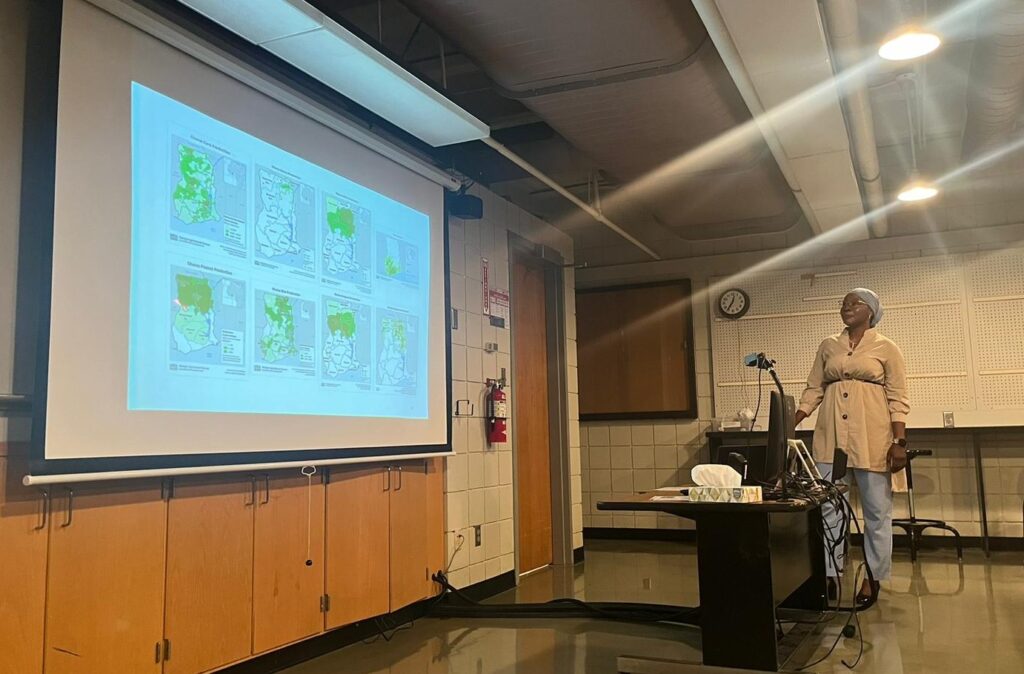
Hyeonji Song of South Korea and Amina Moro of Ghana were the first speakers of the fall semester for the Agronomists from Around the World (AAW) seminar series on Sept. 6. The seminars were started as a way to learn about broad agricultural topics from fellow graduate students. However, undergrads, graduate students, visiting scholars, interns, faculty, and staff are welcome to join one of the most fun and educational activities hosted by the Agronomy Graduate Student Club. The next AAW seminar will be on Sept. 27 with Naresh Venkata Boddepalli of India and Caio Dos Santos of Brazil.
In photo at top: Hyeonji Song presents on South Korea.
Dr. Suza Named to 2024 Top Agri-Food Pioneers List
Dr. Suza was named to the Top Agrifood Pioneers (TAP) List by the World Food Prize Foundation, Emerging Leaders Academy. In honor of the organization’s 38th anniversary, 38 global innovators are being recognized as TAP trailblazers – driving change in agriculture and global food security. This group will form the first cohort of TAP and will be recognized at the 2024 Borlaug Dialogue in Des Moines, Iowa. Dr. Lisa Schulte Moore from NREM was also on the list. Read more


